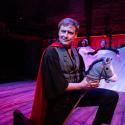The New York theatre is so consistently awash in "star is born" moments when one or another British actor crosses the Atlantic to copious praise that it's lovely for a change to be able to reverse the kudos. And as Phil Connors, the jaded weatherman for whom February 2 threatens to become a personal Waterloo, Broadway veteran Andy Karl in his London stage debut sends the stage musical adaptation of Groundhog Day soaring.
Sure, there's plenty else to admire about a new musical that had its own sights set on Broadway well before it even opened, and that re-teams composer Tim Minchin and director Matthew Warchus for the first time since their magical, world-beating Matilda.
 But as of now, one can't divorce the emotional impact of the show from Karl's career-defining occupancy of the malcontent first played by Bill Murray in the much-loved 1993 film. Onstage, and as conceived afresh by book writer Danny Rubin (who also co-wrote the movie), Karl's dyspeptic womaniser embarks on a journey from the sour toward the sublime, just as a weather-obsessed narrative turns with unforced radiance towards the sun.
But as of now, one can't divorce the emotional impact of the show from Karl's career-defining occupancy of the malcontent first played by Bill Murray in the much-loved 1993 film. Onstage, and as conceived afresh by book writer Danny Rubin (who also co-wrote the movie), Karl's dyspeptic womaniser embarks on a journey from the sour toward the sublime, just as a weather-obsessed narrative turns with unforced radiance towards the sun.
A tale of staggering ingenuity with the directness and force of a fable, Groundhog Day extends the concerns expressed in the glorious "When I Grow Up", one of the signature tunes in Matilda - a score packed with more take-home numbers than Minchin's follow-up here. Phil also will be released in time from the Kafkaesque purgatory that finds him awaking each day to a repeat of the day before as and when he, too, grows up: humankind, it's good to be reminded in these fractious times, cannot live by contempt alone.
The agent of Phil's renewal is his producer, Rita (the large-voiced Carlyss Peer, inheriting Andie Macdowell's screen role, pictured with Karl below), who helps this womanising misanthrope achieve an emotional thaw to complement the elemental one that awaits if he could only choose life over death and find room for compassion amidst his tendency towards the caustic. (The way Phil describes them, the Punxsutawney townsfolk among whom he is stranded in rural Pennsylvania make the riven Suffolk community in, say, Peter Grimes seem like sweetness itself.)
Indeed, Karl is nowhere better than at unveiling the existential crisis beneath Phil's ready swagger: by the time he arrives at the simple admission to Rita that "I know everything about you", one is confronted with a figure of godlike command - so would you be if you knew how your day would play out ad infinitum - who wants to be allowed simply to be. And no wonder: Phil has killed himself so many times during the daily playback that is his life that he no longer knows whether he exists.  So complete is Karl's command that the rest of a sizable ensemble get short shrift, although a second-act opener gives pride of place to a supporting character who hasn't earned her moment in the spotlight: the number (the songs go unnamed in the programme) looks as if it was added to share out the wealth rather than for any more organic reason.
So complete is Karl's command that the rest of a sizable ensemble get short shrift, although a second-act opener gives pride of place to a supporting character who hasn't earned her moment in the spotlight: the number (the songs go unnamed in the programme) looks as if it was added to share out the wealth rather than for any more organic reason.
Nor do the lyrics always sit as easefully on the melodic line as they did in Matilda. Like its predecessor, the show transitions from a minor-key, mordant opening to a more open-throated, big-hearted sound by the finale. One assumes as the production continues towards Broadway that all involved will mine still further the idiosyncratic potential, both musically and lyrically, of a story that couldn't be further from Ghost, the last Hollywood blockbuster Warchus steered towards the musical stage. (One can also see why Stephen Sondheim was drawn to this material: the opportunities for melodic theme and variation are irresistible.)
Rob Howell's perspective-altering design will remind some of Bob Crowley's approach some years back to Carousel, which took its own miniaturist view of small-town America, though Howell on occasion has his cast assemble the set as a nod toward the gathering theme of community. Abetted by Warchus, the company clearly enjoy what opportunities they have to upend expectation once Phil realises that these blighted townsfolk may in fact merit his respect. (Is his daily coffee, for starters, really as dreadful as he had first thought?)
Groundhog Day comes to rest on a note of affirmation all too rarely expressed these days in the world at large: "I'm here and I'm fine," reports Phil, who has come to realise in the tradition of many an emotive musical that a new day can also be the cue for, yes, a new life.















Add comment